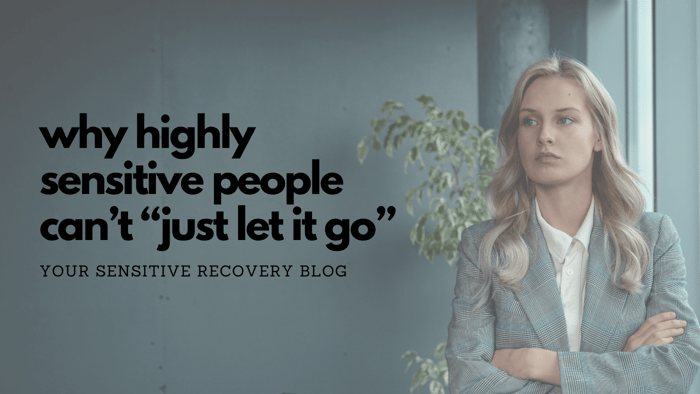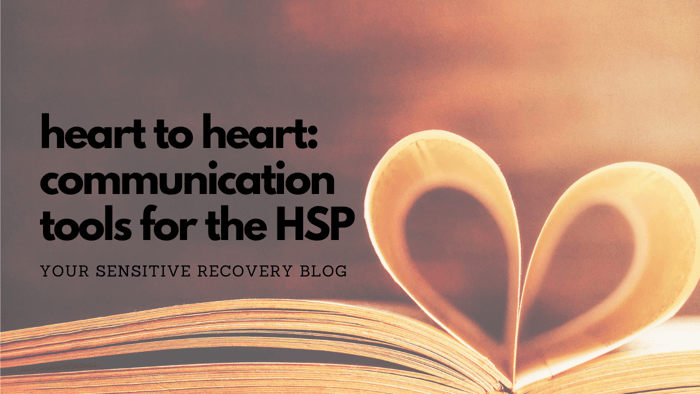If you're a Highly Sensitive Person (HSP), you probably already know that just letting it go isn't something you can simply will yourself to do. Maybe it's an argument, a mistake you've made, a disappointment, or an insensitive comment; yeah, you'd like to move on. You try to. But the harder you try to force it, the more stuck you seem to feel.
Whether it's been reinforced by a well-meaning friend, an exhausted partner, or your own inner critic, being told to "just let it go" doesn't help, and most of the time, it makes things worse.
Well, you're not broken. And for heaven's sake, you're not being too sensitive. You're just wired differently, and understanding why it’s harder for HSPs to move on from things is the first step in learning to do just that in your own time and without shame.
Let's explore a few of the main reasons why this common, unhelpful piece of advice doesn't work and what we can do instead.
Captain Nemo Would Understand: Depth Is Your Nature
Your brain is the Nautilus, not a speedboat. You're built to run deep. That's your "depth of processing" at work. This core HSP characteristic means you don't just think and feel things - you absorb them, analyze them, and reflect on them intensely.
At any given moment, you're thinking about your thinking and having feelings about your feelings.Highly Sensitive folks take in more information from their environment, and then they mull it over, a lot, sometimes consciously, sometimes not. When something upsetting or confusing happens, it doesn’t pass through you quickly. It sinks in and gets tangled up with your memories and your drive for meaning-making. It all takes some time to unravel.
The same goes for the good stuff! You probably get a big, lasting hit off of positive experiences. That's one of the gifts of your depth of processing. But it's so important to remember that when it comes to letting things go or moving on from them, it isn't so much a choice; it’s a process.
The Weight of “What’s Wrong With Me?”
Many HSPs carry around the burden of shame for feeling they are “too sensitive,” “too emotional,” or “too dramatic.” This doesn't come out of nowhere. We've internalized it because it's been said to us throughout our lives (often by the same people who suggest we just let things go).
So when you can’t move on as quickly as you or someone else would like, you're faced with a double whammy: feeling bad about the experience itself and about the way you are handling it.
That extra layer of shame becomes its own obstacle, trapping you in a cycle of self-judgment that makes it even harder to move through whatever you were processing in the first place.
It goes without saying that a Highly Sensitive Person's emotional experience is layered and complex. When you're faced with challenging emotions, there is more to process, more to understand, and more to integrate before a sense of resolution, acceptance, or safety (whatever is needed to move forward) can arrive.
Still Buzzing? That's Your Beautifully Wired Nervous System
Even after a difficult experience is “over" and you feel you've mentally processed what you needed to, your body might not be done responding. Your nervous system may still be in a state of activation.
Highly Sensitive People tend to have more responsive nervous systems, meaning we stay in a state of hyper or hypo-arousal (fight, flight, freeze, or fawn) longer than a neurotypical person might. This is especially true for sensitive folks who have a history of trauma.
"Letting it go" is simply not possible until your body feels safe enough to do so.And safety, for sensitive folks, can take more time and intention to restore. The more you try to force yourself to move on before you're ready, the more stuck and unbalanced you will feel.
What If You Were Allowed to Take Your Time?
Speaking of time, what if "just letting it go" could happen on your terms? When you give yourself permission to move slowly and to fully honor your experience, including your thoughts and feelings about it, you create space for the healing and resolution to unfold naturally.
Now, I understand that there are times when we feel pressured to move things along (so you can get through that meeting with your boss or the dinner party you're hosting in 5 minutes). In these times, if we choose to stuff it down, compartmentalize it, and get on with things, do yourself a favor and make a point to come back to the following questions later.
Instead of pushing yourself to “just let it go,” try asking these 3 questions:
- What am I still holding, and why does it matter to me? If it's an emotion, what is it? If it is an unmet need, can you name it? Don't focus on letting it go. Focus on letting it be heard.
- What would the gentle possibility of letting go look like if it's not a command? What would need to happen, and what steps within your control would you have to take? (Focus on steps that you can take, rather than on what you'd like someone else to do.)
- What would the right support or compassion look like right now? Consider what it would look like coming from other people and from yourself. It's not always possible to receive it from another, but giving it to yourself is entirely within your control.
There is nothing wrong with you, you highly sensitive wonder. You don’t need to try and become less sensitive in order to be ok in this world. You just need the right tools and someone to understand and reflect to you that you are amazing, just as you are. 💕
✨ Josie Munroe, LMFT is a licensed therapist and owner of JosieMunroe.com and Your Sensitive Recovery. As a recovered clinician and Highly Sensitive Person, she loves supporting others on their journeys to form new, empowered relationships with food, their bodies, and their sensitivity. Join the newsletter for a weekly boost of hope and inspiration. You deserve a recovery that works for you! ✨





